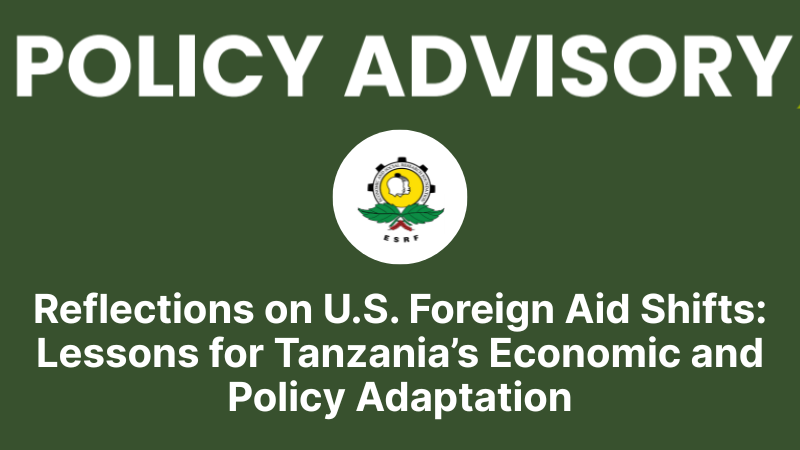The Economic and Social Research Foundation (ESRF) has published a policy advisory titled “Reflections on U.S. Foreign Aid Shifts: Lessons for Tanzania’s Economic and Policy Adaptation”.
The advisory, authored by D. Mushi, J. Kasindi, R. Ngilangwa, and S. Libena, examines the potential impact of recent changes in U.S. foreign aid policy on Tanzania’s economy and development programs.
U.S. Aid Suspension and Its Implications for Tanzania
The report highlights the suspension of U.S. foreign aid programs, including those managed by the United States Agency for International Development (USAID).
The U.S. has been Tanzania’s largest bilateral donor, contributing over USD 7.5 billion in the past two decades to support health, education, agriculture, and economic development.
However, the current freeze on USAID funding, amounting to approximately USD 450 million annually, poses significant risks to Tanzania’s macroeconomic stability and development progress.
Key Findings:
- Macroeconomic Risks: The potential loss of USD 450 million in annual aid could reduce foreign exchange reserves, weaken the Tanzanian shilling, and increase import costs, exacerbating fiscal pressures.
- Health Sector Vulnerability: USAID funding accounts for 70% of Tanzania’s health sector support, particularly in HIV/AIDS programs, maternal and child healthcare, and malaria prevention. The freeze could lead to the closure of clinics, the termination of essential services, and job losses for healthcare workers.
- Impact on Agriculture and Education: USAID-funded programs supporting smallholder farmers, food security, and rural livelihoods are at risk. The education sector faces challenges in maintaining progress in teacher training, infrastructure development, and learning quality.
Health Sector: The Most Affected
The report identifies the health sector as the most vulnerable to the funding suspension.
USAID’s contributions to HIV/AIDS programs, maternal and child healthcare, and malaria prevention have been critical in improving health outcomes in Tanzania.
The freeze threatens the closure of clinics, termination of home-based care programs, and a halt in essential services provided by NGOs. Vulnerable populations, such as pregnant women, children, and people living with HIV/AIDS, are at the greatest risk.
The potential job losses for healthcare workers and program staff employed under U.S.-funded initiatives could undermine Tanzania’s healthcare system and have broader economic implications, particularly in rural areas.
Agriculture and Education: Risks to Progress
The ESRF also highlights the risks to other sectors, such as agriculture and education. USAID-funded programs supporting smallholder farmers, food security, and rural livelihoods are at risk of closure.
This could lead to reduced crop yields, increased poverty, and economic inequality in rural communities.
In the education sector, the freeze could derail progress in teacher training, infrastructure development, and learning quality.
Programs like the Global Partnership for Education, which have supported pre-primary and primary education, may face funding challenges, leading to larger class sizes, insufficient learning materials, and a decline in educational quality.
Recommendations for Policy Adaptation
To address these challenges, the ESRF recommends a comprehensive impact assessment and strategic economic adjustments.
The report emphasizes the need for Tanzania to diversify funding sources, strengthen institutional capacity, and foster resilience in donor support to ensure the sustainability of development programs.
Key recommendations include:
- Conducting a thorough impact assessment to identify vulnerable sectors and populations.
- Exploring alternative funding sources, such as public-private partnerships and increased domestic revenue generation.
- Engaging international partners for technical assistance and support.
- Developing contingency plans for future funding disruptions.
For more details, the full report is available on the ESRF website: www.esrf.or.tz/usaidreflections.pdf.










